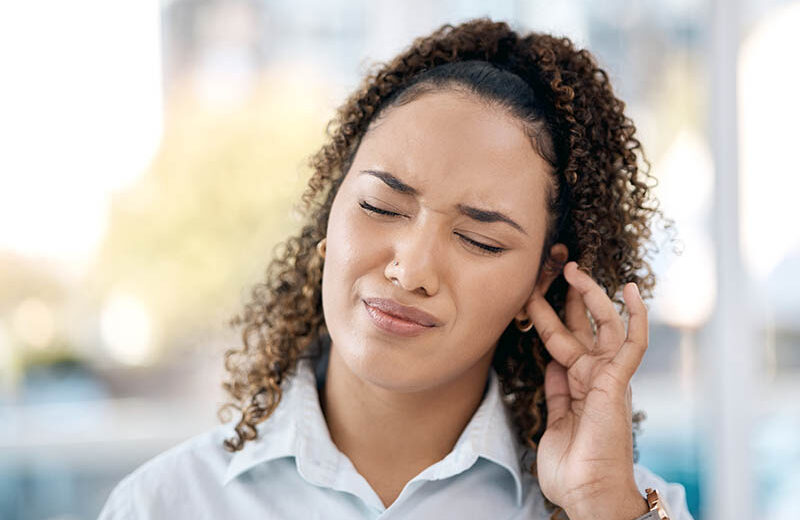Hearing problems can arise due to various factors and affect people of all ages. Learning about these conditions is crucial to adjust and manage them effectively, rather than constantly living in fear. This article will discuss some of the most common hearing ailments and issues, their causes, and external factors contributing to hearing loss. We aim to educate and empower you to make knowledgeable determinations about your hearing health and when to seek assistance if necessary.
What are the Most Common Hearing Ailments?
Otitis Media (Ear Infections)
Ear infections are a typical cause of temporary sudden hearing loss, which may occur due to bacterial, viral, or fungal infection, causing inflammation and accumulation of fluid in the middle ear. Symptoms of ear infections include pain, fever, and difficulty hearing.
Although most ear infections resolve on their own, some may require medical treatments, such as antibiotics. It is crucial to seek medical attention, as untreated infections can lead to chronic ear infections and permanent hearing damage.
Ruptured Eardrum
Occasionally, the thin layer that separates the outer and middle ear can become torn or punctured, leading to a perforated or ruptured eardrum. This can be caused by a sudden change in air pressure, loud noises, or injury. As a result, you may experience temporary pain, a feeling of fullness in the ear, and hearing loss. The eardrum can heal in minor cases, but more extreme issues may require medical intervention, such as surgery.
Sinus Infections and the Common Cold
Temporary hearing loss can occur due to congestion and inflammation in the Eustachian tubes caused by colds and sinus infections. These tiny tubes link the middle ear to the back part of the throat, and when they become blocked, it can lead to feelings of fullness in the ears or diminished hearing. Treatment options include over-the-counter medications to relieve symptoms and promote drainage, but in some cases, antibiotics may be necessary.
Otitis Externa (Swimmer’s Ear)
Otitis externa, also known as swimmer’s ear, is an ailment that impacts the outer ear canal. This condition is often caused by water getting trapped in the ear after swimming, leading to bacterial or fungal growth.
Symptoms of swimmer’s ear include pain, itchiness, and hearing loss. This condition is commonly treated with antibiotics or antifungal ear drops, but prevention is key. It is crucial to thoroughly dry your ears after swimming and avoid putting anything inside them.
Acoustic Neuroma
This non-cancerous growth develops on the vestibulocochlear nerve, which unites the inner ear to the brain. The tumor can lead to hearing loss, tinnitus (ringing in the ear), and balance problems. Treatment options include observing the tumor’s growth, surgery, or radiation therapy, depending on the speed and size of development.
Facial Nerve Problems
Facial nerve problems, such as Bell’s palsy or Ramsay Hunt syndrome, may result in hearing loss. These conditions can cause facial muscle weakness or paralysis, impacting the muscles responsible for sound transmission in the middle ear. Treatment options may involve corticosteroids, antiviral medications, or physical therapy.
Hearing Loss Due to External Factors
Hearing loss can result from issues related to the inner ear and external factors such as aging, medication, or sudden, unexpected causes. It is crucial to be aware of these external factors to comprehend the potential risks and take preventive measures whenever possible.
Hearing Loss Related to Age
Presbycusis, known as age-related hearing loss, is a gradual decline in hearing ability as we age. This condition results from changes in the inner ear, the auditory nerve, or the brain’s ability to process sound. Although it is a natural part of aging, it can be addressed with hearing aids and other assistive devices.
Hearing Loss Induced by Medications
Medications, such as antibiotics, diuretics, and other drugs, can induce hearing loss as a side effect, a condition known as ototoxicity. The degree of harm to the inner ear may vary depending on the medication and dosage, and it can be either temporary or permanent if you are worried about the potential impact of medications on your hearing. It is advisable to consult with a healthcare provider to discuss alternative treatments or risk mitigation strategies.
Acute Hearing Loss
Sudden hearing loss is a rapid and unexplained reduction in hearing that can happen in one or both ears. The causes can range from viral infections, autoimmune diseases, and head injuries to exposure to loud noise. Corticosteroids are used to treat sudden hearing loss, but it is essential to seek medical attention immediately. Early intervention can greatly enhance the chances of recovery.
Awareness of common hearing conditions and their causes is crucial to maintain good hearing health. If you suspect that you or someone you know may have hearing loss, it is essential to contact us today. Early intervention can significantly impact the prognosis and quality of life for people impacted by hearing loss.





